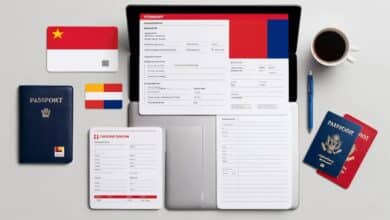New Zealand Caregiver Visa Sponsorship (AEWV): accredited employers, job check, median-wage rules and pathway to residence.
For dedicated professionals in the healthcare field, a unique opportunity exists to build a life and career abroad.
The Care Workforce Work to Residence program offers a clear route from temporary employment to permanent residency.
This initiative is designed to address critical shortages in the care workforce. It ensures that communities receive the essential support they need. The program operates under the Accredited Employer Work Visa (AEWV) framework.
A wide range of roles qualify for this work residence pathway. These include positions like Aged or Disabled Carer, Nursing Support Worker, and Disabilities Services Officer. Each role is vital to the nation’s health system.
Understanding the requirements is the first step. This guide will explore employer accreditation, wage rules, and the transition to residence status. It provides clear information for a successful application journey.
Understanding the New Zealand Caregiver Visa Sponsorship Process
For those in the care sector, this program represents a comprehensive solution for building a long-term future abroad. It operates within the Accredited Employer Work Visa system, creating a clear progression from employment to permanent settlement.
What this visa entails
The pathway begins with securing a position through an accredited employer. This employment serves as the foundation for temporary authorization and eventual residence application.
Applicants must complete 24 months of continuous work in qualifying roles. This creates a predictable timeline for planning the immigration journey. The process ensures steady progression toward permanent status.
Key benefits and opportunities
Once residence is granted, individuals gain the ability to stay indefinitely. They receive travel conditions allowing multiple entries during the initial period.
Holders enjoy complete freedom to work for any employer and study anywhere. This flexibility represents a significant advantage over temporary arrangements. Family members can accompany the primary applicant throughout the process.
The opportunities extend to potential citizenship after five years of residence. This provides a complete immigration pathway for care professionals seeking permanent settlement.
Accredited Employers and Job Check Requirements
Qualifying for the work-to-residence program requires employment with an organization that has passed rigorous accreditation checks. These employers form the backbone of the immigration pathway for care professionals.
Role and criteria of accredited employers
An accredited employer has demonstrated compliance with strict hiring standards. These organizations undergo thorough vetting by immigration authorities.
The accreditation process ensures employers provide genuine opportunities with fair conditions. Major providers like Bupa, the nation’s largest aged care organization, maintain this status.
This system protects workers from exploitation while maintaining sector integrity. Employers must offer positions that are permanent or fixed-term for at least 12 months.
How job checks ensure employment standards
Job checks verify that employment offers meet essential requirements. They confirm positions pay at least the specified wage threshold.
These assessments maintain consistency across the care workforce sector. They ensure competitive remuneration and job security for international workers.
The process safeguards both employees and the immigration system. It guarantees only legitimate, properly compensated roles lead to residence pathways.
Navigating Median-Wage Rules and Care Workforce Sector Standards
The compensation standards for care professionals follow specific sector guidelines that differ from general immigration rules. These specialized wage requirements ensure fair treatment throughout the qualification period.
Overview of current wage requirements
The care workforce sector maintains distinct pay thresholds that applicants must meet. These standards apply to all qualifying employment periods.
Current wage requirements include:
- NZD $27 per hour for work between September 2021 and June 2022
- NZD $28.25 per hour from July 2022 onward
- Equivalent annual salary meeting these hourly rates
Applicants must demonstrate consistent compliance throughout their 24 months of qualifying work. Any period below these thresholds cannot count toward residence eligibility.
The sector standards protect workers and maintain industry integrity. They ensure compensation comparable to local professionals in similar roles.
Understanding these specific requirements helps professionals plan their application timeline effectively. Meeting the wage thresholds is essential for progressing toward permanent status.
Eligibility Criteria and Application Requirements
Before starting the application process, candidates must carefully review all eligibility criteria and prepare accordingly. Meeting these standards is essential for progressing from temporary work to permanent residence status.
Work Experience and Income Requirements
Applicants need at least 24 months of qualifying work experience. This employment must occur within 30 months before applying for residence.
They must have held appropriate work authorization throughout this period. The income requirements specify payment at the sector wage rate for all 24 months.
Health, Character, and Language Prerequisites
All applicants must meet specific health standards. Medical examinations and chest X-rays are required for those aged 15 or older.
Character conditions involve providing recent police certificates from relevant countries. Language proficiency must be demonstrated through approved methods.
Age Limitations and Other Essential Conditions
Applicants must be aged 55 or younger when submitting their application. Several other essential conditions apply to qualify for residence.
Key requirements include:
- Current employment with an accredited employer
- Valid medical certificates issued within 3 months
- English test results no older than 2 years
- Police certificates valid for 6 months
Understanding these requirements helps professionals plan their pathway effectively.
Pathway from Temporary Work Visa to Residence
The journey from temporary worker to permanent resident follows a clear, structured timeline. This work residence pathway requires meeting specific employment duration and wage criteria.
Steps to transition from a temporary visa to residency
Applicants begin with an Accredited Employer Work Visa. This temporary authorization allows them to start accumulating the required 24 months of qualifying employment.
During this period, continuous work in eligible care roles is essential. Professionals must maintain proper wage levels throughout both years.
After completing the 24-month requirement, candidates can apply for the Care Workforce Work to Residence Visa. This critical step grants indefinite stay rights while maintaining employment.
The initial travel conditions last for two years from arrival. During this time, applicants should maintain their primary home in the country.
Following this period, eligibility opens for a Permanent Resident Visa. This removes travel restrictions and provides greater flexibility.
The final milestone comes after five years of residence status. Most individuals can then apply for citizenship, completing the full immigration journey.
Careful planning ensures smooth transitions between each visa stage. Maintaining valid status and meeting all criteria is essential for success.
Essential Documentation for a Successful Visa Application
Gathering the correct paperwork is a critical step toward a successful immigration application. Proper organization of these materials streamlines the submission process. It ensures all requirements are met efficiently.
Employment agreements and income evidence
Employment documentation forms the foundation of the submission. Applicants must provide contracts covering the entire 24-month qualifying period. These agreements should clearly show position titles and duties.
Income evidence requires official summaries from tax authorities. These confirm work at or above the sector wage rate. Additional pay slips might be requested during assessment.
Current job offers with accredited employers must be documented. Positions should be permanent or fixed-term for at least 12 months.
Translation and verification of documents
All non-English materials need certified translations. Qualified translators must complete this work according to official standards. Original documents should accompany translated versions.
Identity papers include passport copies for all family members. Photos must meet specific size and quality requirements. Medical certificates remain valid for only three months.
Police certificates demonstrate good character conditions. They must cover complete criminal history from all relevant countries. These documents maintain six-month validity periods.
English language proof through test results or qualifications completes the package. Test scores cannot be older than two years at submission.
Medical Examinations and Police Certificates in the Application
Health screenings and background checks serve as fundamental requirements that applicants must successfully navigate. These documents verify both physical well-being and personal character.
Overview of the required medical tests
All primary applicants and family members aged 15 or older need comprehensive medical examinations. These include mandatory chest X-rays conducted by approved physicians.
Children have age-specific requirements. Those 10 or younger typically need examinations without X-rays. Children aged 11-14 require both tests, with blood work only if requested.
Timing is critical for medical evidence. All certificates must be less than three months old when received. Previous medical examinations from within three years may sometimes be accepted.
The character assessment requires police certificates from applicants 17 or older. These documents must come from every country of citizenship and any nation where applicants spent 12 months cumulatively in the past decade.
All police certificates must be less than six months old at application submission. They must show complete criminal history from any time period, not just recent years. Non-English certificates need certified translation.
These thorough checks ensure applicants meet health standards and pose no security risk. Proper preparation of these documents streamlines the application process significantly.
Step-by-Step Process for Submitting Your Application Online
Preparing for online submission involves strategic planning of document timing and organization. The digital platform streamlines the process while ensuring all requirements are properly addressed.
Gathering documents and filling forms
Begin by systematically collecting all required materials. Use the comprehensive checklist to ensure no essential documents are overlooked.
Time-sensitive materials need careful scheduling. Medical examinations remain valid for three months, while police certificates last six months. Plan appointments accordingly to maintain validity.
Create or access your Immigration account to start the online application. Complete each section with meticulous attention to detail. Ensure all personal information matches passport details exactly.
Submission guidelines and post-application follow-up
Upload all supporting materials in acceptable formats after completing the form. Organize files clearly according to official guidelines. Payment occurs during this final submission step.
The waiting period begins once you submit application materials. Monitor your account and email regularly for any requests. Respond promptly to avoid processing delays.
Check your account status regularly for updates. Approved applicants receive an eVisa notification by email. Maintain valid status throughout the assessment process.
This systematic approach helps applicants complete application requirements efficiently. Proper preparation minimizes errors and accelerates processing times.
New Zealand Caregiver Visa Sponsorship: Best Practices and Insider Tips
Success in the care workforce pathway often comes down to strategic preparation and understanding employer perspectives. Learning from those who have successfully navigated the process provides valuable guidance for new applicants.
Insights from accredited employers
Major organizations like Bupa actively recruit international professionals for care roles. They emphasize cultural fit and thorough preparation during the hiring process.
Bupa’s person-first approach extends to supporting applicants throughout their journey. They encourage joining talent communities to learn about opportunities early.
Regional location considerations significantly impact long-term satisfaction. The country offers diverse settings from urban centers to coastal communities.
Strategies to overcome common challenges
Documentation gathering requires advanced planning. Start collecting materials at least six months before submission.
Key preparation strategies include:
- Maintain detailed employment records throughout the work period
- Schedule medical exams and police certificates with validity periods in mind
- Prepare specifically for formal English testing requirements
- Network with others who have completed the process
Building relationships with potential employers before formal application strengthens outcomes. Many organizations offer programs that provide essential information and support.
Online communities dedicated to immigration experiences offer practical insights. This peer support helps navigate the complex requirements successfully.
Conclusion
A clear route exists for healthcare workers to transition from temporary employment to permanent resident status in their chosen destination. This pathway addresses critical needs in the care sector while offering professionals genuine long-term opportunities.
Success requires understanding specific requirements like age limits, 24 months of qualifying work, and wage thresholds. Proper preparation and document organization are essential for a smooth application process.
With careful planning and employer support, qualified professionals can build secure futures. The program provides meaningful contributions to communities while enabling personal and professional growth.
For more information, explore the official visa website mentioned in this article:
You will be redirected to another website
FAQ
What is the role of an accredited employer in this process?
An accredited employer is a business approved by Immigration New Zealand to hire migrant workers. They must meet specific standards and provide a genuine job offer. Their sponsorship is essential for the work visa application.
How does the job check requirement protect applicants?
The job check ensures the employment offer meets local sector standards. It verifies that the role is genuine, the pay is at least the median wage, and working conditions are fair. This step safeguards workers from exploitation.
What are the current median-wage requirements for these roles?
The pay must meet or exceed the median wage set by the government, which is periodically updated. For many positions in the care workforce sector, this is a mandatory condition for visa approval.
What are the typical health and character prerequisites?
Applicants must be in good health and of good character. This usually involves a medical examination and a police certificate from any country they have lived in for 12 months or more over the last ten years.
Is there a direct pathway to residence from this temporary work visa?
Yes, after working for a specified period, typically 24 months, under the Accredited Employer Work Visa, individuals in eligible care workforce roles may apply for a Work to Residence visa, leading to permanent residency.
What key documents are needed for a complete application?
Essential documents include a valid passport, the job offer from an accredited employer, employment agreement, proof of qualifications, police certificates, and medical examination results. All non-English documents must be translated.
What does the medical examination for the visa involve?
The medical tests generally include a chest x-ray, a physical exam, and blood tests. These screenings are to ensure an applicant does not have conditions that would pose a significant health burden or risk to the public.
What is the step-by-step process for submitting an online application?
The process involves gathering all required documents, creating an account on the Immigration New Zealand website, accurately completing the online forms, uploading supporting evidence, paying the fee, and submitting the application for processing.
Published on: 17 de October de 2025







